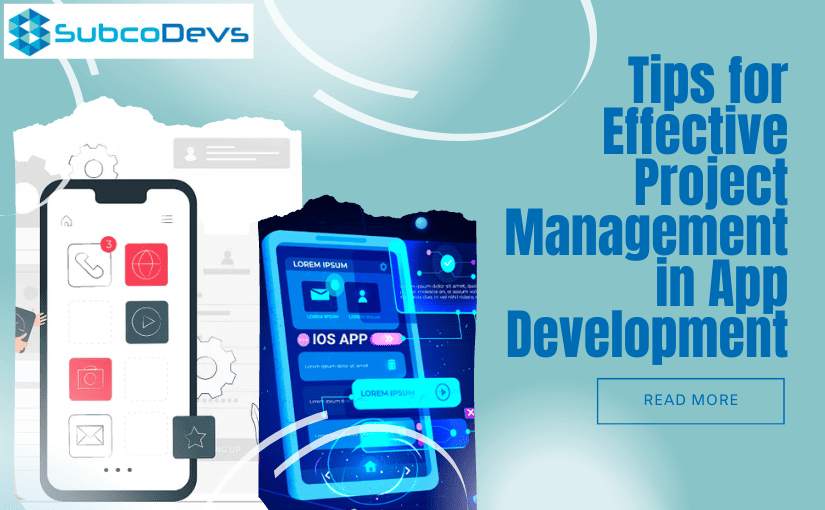Mobile app development is a complex and dynamic process that requires careful planning, execution, and coordination among various teams and stakeholders. Effective project management plays a crucial role in ensuring the success of app development projects. By employing the right methodologies, tools, and practices, app development companies can streamline their workflows, enhance team collaboration, and deliver high-quality apps on time and within budget.
In this blog, we will delve into essential tips for effective project management in app development, providing valuable insights to help teams navigate the challenges and complexities of the development process.
1. Define Clear Objectives and Requirements
Before embarking on an app development project, it is vital to define clear and specific objectives. Understanding the app’s purpose, target audience, and desired features is essential for project success. Collaborate with clients and stakeholders to gather detailed requirements and create a comprehensive project scope. Ensure that all parties involved have a shared understanding of the project’s goals, timelines, and deliverables.
2. Choose the Right Project Management Methodology
Selecting the appropriate project management methodology is fundamental to ensure a smooth development workflow. Two popular methodologies in app development are Agile and Waterfall.
- Agile: Agile methodologies, such as Scrum or Kanban, are well-suited for app development due to their flexibility and iterative approach. Teams can break down the project into smaller sprints, allowing for continuous feedback, adaptation, and early delivery of functional components.
- Waterfall: Waterfall is a more traditional and linear approach, where each phase of development follows a strict sequence. While it may work for smaller, well-defined projects, its lack of flexibility can be limiting in dynamic app development environments.
Understanding the strengths and weaknesses of each methodology is crucial in choosing the one that aligns best with the project’s needs.
3. Effective Communication and Collaboration
Clear and consistent communication is the backbone of successful app development projects. Establish channels for open and transparent communication among team members, clients, and stakeholders. Regularly scheduled meetings, stand-ups, and progress reports help keep everyone informed about project status, challenges, and milestones. Collaboration tools like Slack, Trello, or Asana can facilitate seamless communication and task management.
4. Utilize Project Management Tools
App development projects involve numerous tasks and processes that need to be organized and tracked efficiently. Employing project management tools helps in planning, scheduling, assigning tasks, and tracking progress. Tools like Jira, Microsoft Project, or Basecamp can help teams stay organized, improve productivity, and identify potential bottlenecks early in the development process.
5. Set Realistic Timelines and Milestones
Establishing realistic timelines and milestones is critical to managing client expectations and maintaining project momentum. Break down the project into manageable phases and allocate appropriate time for each stage. Consider potential delays and allocate buffer time to handle unforeseen challenges that may arise during development. Regularly review and update the project schedule to ensure it remains achievable.
6. Emphasize Quality Assurance and Testing
Quality assurance and testing are integral to delivering a bug-free and user-friendly app. Implement a robust testing strategy to identify and fix issues at various stages of development. Conduct unit testing, integration testing, user acceptance testing (UAT), and beta testing to ensure the app meets the desired quality standards.
7. Foster a Collaborative and Supportive Team Culture
A cohesive and motivated team is essential for project success. Encourage a culture of collaboration, creativity, and open feedback within the development team. Recognize and celebrate team achievements to boost morale and foster a positive work environment. Regular team-building activities and training sessions can also enhance skills and team dynamics.
8. Manage Risks Proactively
App development projects are subject to various risks, such as changing requirements, resource constraints, and technology disruptions. Identify potential risks early in the project and develop risk mitigation strategies. Regularly assess risks and update mitigation plans as needed to keep the project on track.
9. Regularly Monitor and Evaluate Progress
Project managers should continually monitor project progress and performance against established metrics and KPIs. Analyze the data to identify trends, areas for improvement, and potential roadblocks. Regular project evaluations enable proactive decision-making and adjustments to ensure project success.
10. Client Engagement and Feedback
Engaging clients throughout the development process is vital to building trust and delivering a product that meets their expectations. Provide regular updates, demo the app’s progress, and actively seek client feedback. Incorporate client input into the development process to enhance the app’s usability and functionality.
Effective project management is a cornerstone of successful app development. By defining clear objectives, choosing the right methodology, fostering effective communication, and utilizing the appropriate tools, app development companies can streamline their workflows and deliver high-quality apps efficiently. Regularly evaluating progress, managing risks proactively, and engaging clients throughout the process will ensure a smooth and successful app development journey.
With these valuable insights and best practices in mind, app development teams can navigate the complexities of their projects with confidence and achieve outstanding results.
Ready to turn your app idea into reality? Contact us today and let’s create your dream app together.
